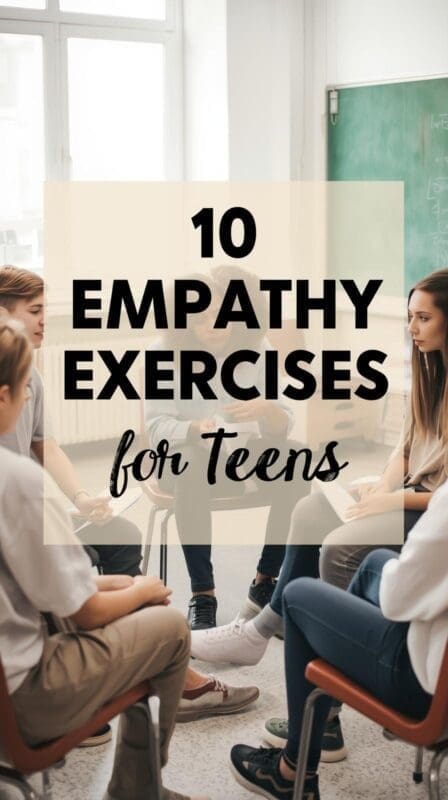Adolescence is a season of big feelings and rapid change. Friends become anchors, identity starts to crystallize, and social dynamics feel louder than ever. In the middle of it all, empathy—the ability to understand and share another person’s feelings—becomes a stabilizer. It helps teens communicate without escalation, navigate conflict with more grace, and build friendships that actually last.
But empathy rarely grows by lecture. It grows through practice. The activities below are structured, engaging empathy exercises for teens that work beautifully in SEL activities for high school, counseling groups, advisory periods, and family conversations at home. Each includes why it works, materials, timing, facilitation steps, and debrief prompts so you can run them with confidence.
Why Empathy Training Matters in Adolescence
- Brain and behavior: Teens’ social reward systems are highly active. Practicing perspective-taking helps channel that sensitivity into connection rather than conflict.
- Belonging and resilience: When teens feel seen and learn to see others accurately, they’re more likely to repair misunderstandings, ask for help, and resist peer pressure.
- Conflict de-escalation: Empathy paired with communication skills reduces “you always/you never” standoffs and improves classroom climate.
Trauma-informed note: Some students carry heavy stories. Offer opt-outs, allow silent participation (writing, drawing), and avoid pressuring personal disclosures.
Set-Up Tips for Any Empathy Activity
- Time: 10–20 minutes per exercise + 5–10 minutes debrief.
- Room: Chairs in a circle or paired stations; reduce background noise.
- Norms: Listen to understand, one mic at a time, permission to pass, confidentiality reminder where appropriate.
- Language: Model “I” statements, curiosity questions, and strength-based feedback.
1) Role-Reversal Debates
Best for: Perspective-taking, respectful disagreement
Materials: Prompt cards with age-appropriate topics
Time: 20 minutes
How it works
- In pairs, assign a topic (e.g., “Phones during lunch,” “Group work vs. solo work”).
- Each teen argues the opposite of their real opinion for 2 minutes.
- Switch sides, then open a 5-minute discussion on what felt surprising.
Why it helps
Challenging your own position builds cognitive empathy and reduces black-and-white thinking—core goals of social emotional learning in secondary grades.
Debrief questions
- What was hard about arguing the opposite view?
- What part of the other side felt reasonable?
- How might acknowledging one reasonable point change a heated conversation?
Trauma-sensitive tip: Avoid personal or identity-based topics. Keep it low-stakes and school-relevant.
2) Active Listening Pairs
Best for: Validation skills, rapport, counseling group activities
Materials: Timer, prompt list
Time: 15 minutes
How it works
- Partner up. Speaker shares a small, real story for 90 seconds while listener only listens.
- Listener reflects back: “What I hear is…” + one feeling word.
- Speaker confirms or clarifies; switch roles.
Why it helps
Validation lowers defensiveness and models co-regulation—key in emotional regulation for teens.
Debrief questions
- Which reflection felt most accurate?
- What did it feel like to be fully listened to without interruption?
Extension: Add a “curiosity follow-up” rule: one open question only, no advice.
3) Empathy Through Media
Best for: Linking current events to emotions and needs
Materials: Short film clip, ad, or news blurb; projector
Time: 15–20 minutes
How it works
- Show a 60–90 second clip or read a short article paragraph.
- Ask: “What might each person be feeling? What need is underneath that feeling?”
- Brainstorm one supportive response for each character.
Why it helps
Distancing the scenario reduces social risk while practicing the same SEL standards: identify feelings, infer needs, plan compassionate action.
Debrief questions
- How did your interpretation change as you got more context?
- What’s one respectful response that doesn’t mean agreement?
4) Compliment Chain (Specific, Not Generic)
Best for: Strength spotting, positive culture
Materials: None
Time: 10 minutes
How it works
- Sit in a circle. Student A offers a specific compliment to Student B.
- B compliments C, and so on.
- Model evidence-based praise: “I noticed you stayed after to help clean up.”
Why it helps
Specificity builds credibility and belonging, which are protective factors for mental health in adolescence.
Debrief questions
- Which compliment felt most genuine and why?
- How can you bring that specificity into feedback in group projects?
5) “If I Were in Your Shoes” Journaling
Best for: Quiet reflection, lower social risk
Materials: Journals or paper, pens
Time: 12–15 minutes
How it works
- Prompt options:
- “If I were in my friend’s shoes during a misunderstanding, I might feel…”
- “One time a teacher misread me—here’s what I wish they knew…”
- Share in pairs or turn in privately.
Why it helps
Writing slows thinking and makes space for nuance. It’s ideal for introverts or students who need time to process before they speak.
Debrief questions
- What changed when you wrote from someone else’s perspective?
- Where did you notice assumptions?
6) Empathy Interviews
Best for: Deep listening, vulnerability with structure
Materials: Interview sheets with 5–7 questions
Time: 20 minutes
How it works
- Pair students. Each interviews the other with gentle prompts:
- “What’s a challenge you faced recently?”
- “What’s something people often misinterpret about you?”
- “What helps when you’re stressed?”
- Partners summarize their partner’s responses to the group (with permission).
Why it helps
Practices accuracy + care. Helps peers see beyond surface assumptions, strengthening classroom climate.
Debrief questions
- What did you learn that surprised you?
- What helped you feel safe sharing?
Safety note: Allow “pass,” and you may collect questions ahead to edit for appropriateness.
7) Perspective Maps (Sees / Hears / Thinks / Feels)
Best for: Cognitive empathy with structure
Materials: Poster or handout
Time: 15 minutes
How it works
- Choose a fictional character or neutral school scenario.
- In quadrants, map: What this person sees, hears, thinks, feels.
- Close with: “Given this map, what response would be actually helpful?”
Why it helps
Visual scaffolding supports students who need a concrete pathway to perspective-taking.
8) Repair Scripts: From “Sorry” to “How Can I Make It Right?”
Best for: Real-world conflict skills
Materials: Mini cards with a 3-step script
Time: 10 minutes
Script
- Reflect: “I see you felt ___ when I ___.”
- Own it: “I’m sorry for ___.”
- Repair: “How can I make it right?”
Why it helps
Empathy culminates in action. Teens learn to move beyond performative “sorry” into tangible repair.
Practice: Use fictional scenarios first; invite voluntary use when conflicts arise.
9) Silent Statements
Best for: Inclusion of anxious/quiet students
Materials: Sticky notes, big chart paper
Time: 12 minutes
How it works
- Post a prompt: “One thing I wish people understood about me is…”
- Students write responses silently and post.
- Silent gallery walk; add check marks or small notes of appreciation.
Why it helps
Reduces social risk while revealing overlapping experiences and normalizing difference.
10) The Two-Truths Reflection
Best for: Nuance, conflict de-escalation
Materials: None
Time: 10 minutes
How it works
- Teach the idea: more than one truth can be “real” at once.
- In pairs, practice this stem: “My truth is ___, and I can see your truth is ___.”
- Use with low-stakes topics first.
Why it helps
Moves teens from “win/lose” to shared understanding—vital for group projects and friendships.
Assessment & Progress You Can Actually See
- Language shift: More feeling words, fewer absolutes.
- Behavioral markers: Students pause, reflect back, and propose repairs independently.
- Climate: Fewer escalations; increased peer help and invitations to join.
- Self-report: Quick exit slips—“I felt understood today: never/sometimes/often.”
FAQs
Do these empathy activities for teens work in mixed-ability classes?
Yes. Use sentence stems, visual scaffolds, and choice of participation (speak, write, or draw).
How do I keep sharing from turning into oversharing?
Set boundaries up front: school-safe topics, no details that identify peers, opt-out allowed, and a clear path to adult support if personal topics emerge.
What if students roll their eyes at “feelings” work?
Lead with relevance: empathy improves group projects, reduces drama, and is a top hiring skill. Keep activities short, concrete, and connected to real teen scenarios.
Can we do this in a 10-minute advisory?
Yes—try Active Listening Pairs one day and a 5-minute debrief the next.
How does this align with SEL standards?
You hit self-awareness (naming feelings), social awareness (perspective-taking), relationship skills (listening, repair), and responsible decision-making.
Closing Reflection
Empathy isn’t about agreement. It’s about accuracy and care. When teens experience being understood—and learn to extend that same understanding—their worlds get bigger. Conflicts soften. Friendships deepen. And the classroom becomes a safer place to try, fail, repair, and try again.
Start with one exercise this week. Keep it short. Debrief with curiosity. The skill grows in the practicing.

About the Author
Hi, I’m Eve, a former school counselor with a master’s degree in School Psychology and a passionate advocate for children and families navigating sensory challenges. As a mom of children with sensory sensitivities, I deeply understand the journey special-needs parents face, and I dedicate myself to researching and sharing practical solutions to help children thrive and feel comfortable in their bodies. My goal is also to empower counselors, therapists, and psychologists with creative strategies and supportive resources to enrich their everyday practice. When I’m not writing or exploring new therapeutic approaches, you’ll find me spending quality time with my family and continually seeking inspiration from everyday moments.



